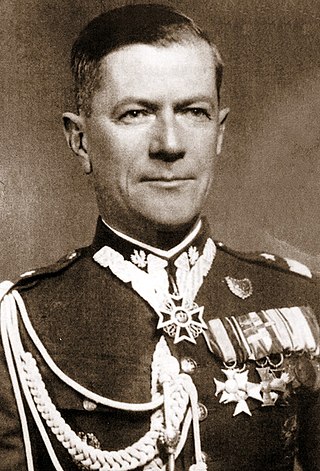Top Qs
Timeline
Chat
Perspective
Mikołaj Bołtuć
From Wikipedia, the free encyclopedia
Remove ads
Mikołaj Bołtuć (21 December 1893 in Saint Petersburg – 22 September 1939 near Łomianki) was a brigadier-general of the Polish Army, commander of the IV Polish infantry Division during World War II.
This article includes a list of references, related reading, or external links, but its sources remain unclear because it lacks inline citations. (November 2015) |
Remove ads
Early life
He was the son of Ignacy Bołtuć, General in the Russian Imperial Army of Polish noble descent, and his wife, Anna Łabuńska, of Rzeczyca.[2]
Career
Summarize
Perspective
Bołtuć was enlisted in the Russian Cadet officers school in Omsk when he was seven.[citation needed]
During World War I, Bołtuć served in the Imperial Russian Army. He fought with distinction in the Finnish Civil War in 1918. After the Bolshevik Revolution, he served as captain in the White Russian Army during the Russian Civil War until the evacuation of Odessa in which he commanded the last leaving vessel.
He returned to Poland and joined the Polish military. He commanded units near Kamieniec, Podolski and elsewhere. During the Soviet-Polish war of 1920, he commanded the unit Strzelcy Kaniowscy. Bołtuć, still a captain, commanded the defence of Zamość. Then he took Wyszków, the location of the puppet government organized by the Bolsheviks.
During the interwar period, he worked for the General Command and later held command functions in Wilno and Toruń. His nomination to the rank of general was held back for several years, in part because of his anti-religious attitude and his reservations about Poland's military spending patterns. He was known for clarity of judgment and leadership skills.[citation needed]
During World War II, he commanded an Operation Group, a unit short of an army, within the Army Pomorze, the only Polish unit that entered German territory (in East Prussia) for two days during the September Campaign and withstood attacks of much larger German forces. The danger of being flanked forced Boltuc to withdraw to Modlin. When the Modlin Fortress could accept only his officers but not his soldiers, he let his soldiers be demobilised, but most refused to leave. He also encouraged volunteers to go with him to try to sneak through the German Siege of Warsaw. According to written family records, he said while he was leaving home before the war, "This is not the war we are going to win and I am not the kind of a soldier who would surrender".
On the morning of 22 September, he was killed at the Battle of Łomianki from sniper fire while he was leading the charge.
Most of his soldiers were buried at the Łomianki cemetery, near Warsaw. Boltuc's tomb, in a form of a field stone, is at the Powązki Military Cemetery, in Warsaw.
Remove ads
Promotions
 Kapitan (Captain) - 1917
Kapitan (Captain) - 1917 Major (Major) - 1919
Major (Major) - 1919 Podpułkownik (Lieutenant colonel) - 31 March 1924
Podpułkownik (Lieutenant colonel) - 31 March 1924 Pułkownik (Colonel) - 1 January 1928[3]
Pułkownik (Colonel) - 1 January 1928[3] Generał brygady (Brigadier general) - 19 March 1939
Generał brygady (Brigadier general) - 19 March 1939
Awards and decorations
 Golden Cross of Virtuti Militari (posthumously)
Golden Cross of Virtuti Militari (posthumously) Silver Cross of Virtuti Militari (1921)
Silver Cross of Virtuti Militari (1921) Commander's Cross of Order of Polonia Restituta[4]
Commander's Cross of Order of Polonia Restituta[4] Officer's Cross of Order of Polonia Restituta (27 November 1929)[5]
Officer's Cross of Order of Polonia Restituta (27 November 1929)[5] Cross of Valour (four times, last in 1922)[6]
Cross of Valour (four times, last in 1922)[6] Golden Cross of Merit ( 19 March 1937,[7] 10 November 1938[8])
Golden Cross of Merit ( 19 March 1937,[7] 10 November 1938[8]) Commemorative Medal of War 1918-1921
Commemorative Medal of War 1918-1921 Medal of 10th Anniversary of Regained Independence
Medal of 10th Anniversary of Regained Independence Silver Medal for Long Service
Silver Medal for Long Service Bronze Medal for Long Service
Bronze Medal for Long Service Commander's Cross of Order of the Star of Romania (Romania)
Commander's Cross of Order of the Star of Romania (Romania) 1914–1918 Inter-Allied Victory medal
1914–1918 Inter-Allied Victory medal
Remove ads
Sources
Wikiwand - on
Seamless Wikipedia browsing. On steroids.
Remove ads

